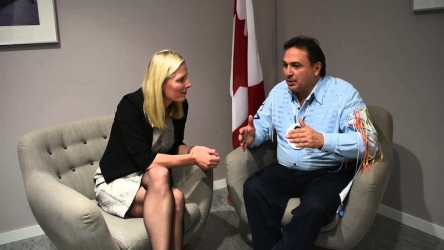Article Origin
Volume
Issue
Year
December 14, 2015
Jesse Cardinal is disappointed that the COP21 climate change agreement only urges nations to consider Indigenous right and traditional knowledge. Indigenous peoples were seeking stronger language to ensure respect and implementation of Indigenous rights.
The coordinator for the Keepers of the Athabasca says maybe she was naïve to think more than that would happen - naïve to believe an international agreement on climate change would entrench Indigenous rights and traditional knowledge.
But, she says, it was hard not to be more than optimistic. After all, Paris was filled with influential, international Indigenous leaders.
“It was an eye-opener of how far we still need to go as Indigenous people,” said Cardinal, who has been working in the environmental movement for years. “It’s an awakening of the plight of the Indigenous people. It always has been and will we always have to continually assert our rights? Sometimes (our rights are) acknowledged and sometimes they’re not.”
Cardinal did not go to Paris, but she followed the proceedings closely. She said Indigenous people were confident their rights and knowledge would figure prominently in any agreement that was hammered out. While that didn’t happen, Cardinal says Indigenous people are leaving Paris with a stronger sense of solidarity and will continue to “assert our rights and protect our lands.”
Another eye-opener, she says, was realizing that Indigenous environmental groups and non-Indigenous environmental groups are “not necessarily on the same page.” While non-Indigenous environmental groups are lauding the move from a two degree cap on temperature rise to 1.5 degrees and the acknowledgement that climate change is actually occurring, Indigenous environmental groups stand on their own in their disappointment that traditional knowledge is not being accepted for the value it provides.
“It really does fall back on our shoulders of the Indigenous peoples,” said Cardinal. “We think we have broader support, but it’s questionable. When the non-Indigenous environmental groups don’t really express outrage the way the Indigenous groups are, there’s a lot more education for these non-Indigenous groups that needs to happen for what the value of Indigenous knowledge really, truly is.”
Cardinal believes some of the disconnect comes from non-Indigenous environmental groups being based in the cities, with science and policies to guide their work, and not on the land where traditional knowledge has been garnered.
Canada’s Indigenous peoples were represented in Paris by Assembly of First Nations National Chief Perry Bellegarde, Congress of Aboriginal Peoples National Chief Dwight Dorey, and Inuit Tapiriit Kanatami President Natan Obed and members of their organizations.
"This global commitment to action is positive, but the agreement indicates the parties may be trying to detract from their existing human rights obligations. First Nations will not allow that to happen. These rights are not optional in fighting climate change,” said Bellegarde in a statement. Bellegarde was invited by Environment and Climate Change Minister Catherine McKenna to join her and Prime Minister Justin Trudeau as one of four members of Canada’s delegation for the opening ceremony.
Cardinal takes heart in Trudeau’s opening address in Paris, in which he stated that Indigenous people knew how to care for the planet and the rest of the world could learn from them. McKenna also championed Indigenous rights.
“We have hope here in Canada,” said Cardinal, noting the difference in Trudeau’s philosophy compared to his predecessor, Stephen Harper.
“We commend the Canadian delegation, the many non-government organizations for their support and advocacy... First Nations and Canada together will lead by example and demonstrate that implementing the rights of Indigenous peoples is the best way to address climate change," said Bellegarde.
The Paris agreement, signed after two weeks of talks, sets the goal of limiting average global temperature rise to 1.5 degrees C; a five-year review cycle starting in 2018 to evaluate and strengthen national action plans towards the goal of zero emissions; financing to help developing and vulnerable nations to deal with the impacts of climate change; and linking climate adaptation goals to mitigation.
- 2497 views

